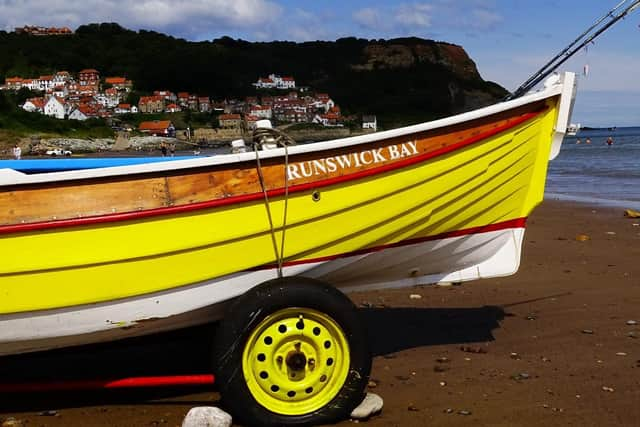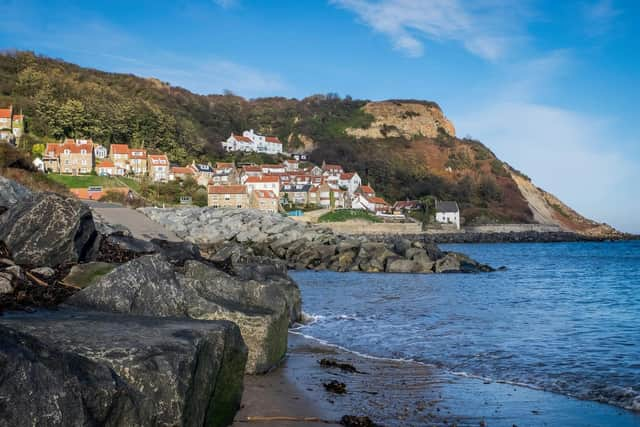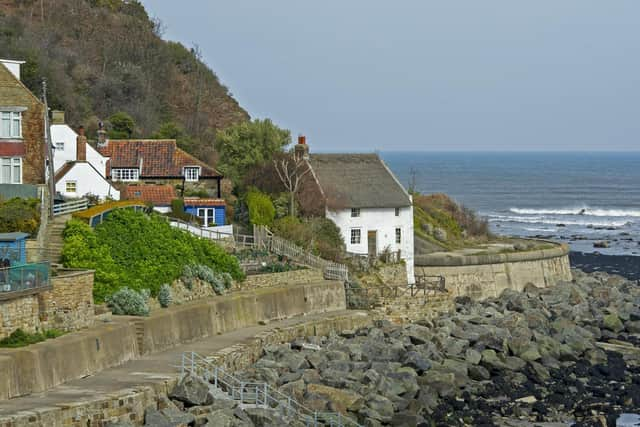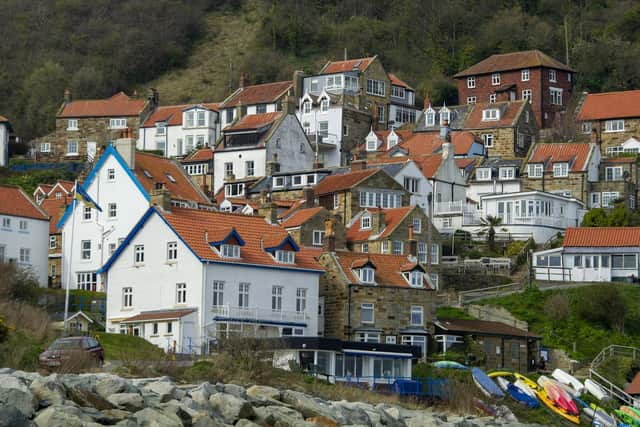The story of how Runswick Bay in North Yorkshire became Britain's best beach
A closed season is almost a laughable suggestion this year in a village that now boasts Britain's best beach after The Times' chief travel writer, Chris Haslam, handed Runswick's sands the coveted accolade in his annual Beach Guide supplement this month.
So why was Haslam so beguiled and entranced by Runswick Bay, a destination so underdeveloped that it has only 80 parking spaces, yet has attracted as diverse and eclectic a selection of visitors as Prince Charles, James Herriot and The Beatles? We spoke to those who live and work there to find out.
From quiet spot to year-round destination
Advertisement
Hide AdAdvertisement
Hide Ad

When Peter McGrath was growing up in Whitby in the 1980s, the town and its surrounding villages had a defined summer season and quiet, bleak winters. The amateur paleontologist and enthusiastic fossil hunter now lives in Hinderwell, a mile inland from Runswick Bay, where he is renovating a 400-year-old farmhouse for his young family.
Peter has organised guided fossil walks 'intermittently' for years, but three years ago realised that something had changed in Runswick Bay. The beach's capacity seemed to increase by several hundred visitors each summer. The secret, it seemed, was out.
His friend and fellow Coastguard volunteer, Andy Monaghan, had come to the same conclusion. An experienced outdoor education instructor, Andy opened a kayak and paddleboard hire centre, Barefoot Kayak, that also offers tuition. He and Peter went into partnership together, running both fossil tours and watersports activities for tourists.
"My mother used to live in Runswick Bay, and I came to fall in love with the place. I know every limpet on the beach! When I started walking around here in the 1990s, it was a quiet place," said Peter.
Advertisement
Hide AdAdvertisement
Hide Ad

"Now, I've never seen Runswick Bay as busy as it has been this summer. The area is a year-round destination. You used to get around 300 people on the beach on a busy day - now it's around 800. There's been an absolute boom.
"My customers are families who have done the beach, been into Whitby, are a few days into their holiday and want something to do with their children. Kids are fascinated by fossils. We get people from all over, with a lot from West Yorkshire and the East Midlands.
"It used to be rare to see a kayak, but now there are a lot more, and kayak fishing has become really popular. Here, we are north-facing, which is unusual on the east coast, we are very sheltered and we have a slipway. The water can be calm here even in a force five gale.
"The water is never warm - it gets up to 14 degrees in October - but people seem far more interested in watersports now."
Advertisement
Hide AdAdvertisement
Hide Ad

The Times' coverage is, of course, likely to put Runswick Bay even more firmly on the tourist map - a prospect which Peter welcomes cautiously.
"We have got only two narrow roads in and out of the village, and there are cars everywhere at the moment. Tourism is the lifeline here, of course, and farmers have started opening their fields for parking.
"But we only have two pubs, a small shop, and a beach cafe. We aren't set up for large numbers of people."
There is no shortage of accommodation, thanks to the long-term trend of converting homes into holiday lets, as prevalent here as it is in other honeypot coastal spots. Only a small number of cottages in the bay are occupied full-time by their owners.
Advertisement
Hide AdAdvertisement
Hide Ad

"There is some pressure, but I feel the demand will manage itself, especially when people start going abroad again."
A vibrant and colourful history
To Peter, part of Runswick's appeal is the astonishing amount of history packed into just a small area of land.
The bay and nearby Kettleness - "about a mile away, as the seagull flies" - can boast a Neolithic long barrow, medieval field patterns, the remains of a Roman signal station, the scars of alum mining, and, of course, the world-famous Jurassic cliffs that have been raided by the Natural History Museum, where a Kettleness dinosaur skeleton is on display.
The American sea captain John Paul Jones chased Royal Navy vessels along this coast during the War of Independence, and his targets sheltered from his predations in Runswick Bay. During World War One, German submarines would lurk in the bay as they waited for merchant ships to appear.
Advertisement
Hide AdAdvertisement
Hide AdThe original village fell into the sea in 1682, while all of its residents were attending a funeral. Nobody died, but only the dead man's house was spared the destruction.
Prince Charles and Princess Anne spent childhood holidays on the sands, and the vet Alf Wight - pen name James Herriot - honeymooned in the village. The Beatles and Laurel and Hardy complete an illustrious list of past visitors.
Although the fishing industry has long gone, the recreational cobles that can still be seen are modelled on Norse longboats, a legacy of Viking invasions.
"Kids come on the walks I run and they go home with fossils in their hands. This is one of the few places in the world where a beginner could make great discoveries, where an eight-year-old child could pick up something that could make a difference to science."
Fully booked
Advertisement
Hide AdAdvertisement
Hide AdHelen Massey is in the midst of the busiest season she can recall. A chartered surveyor by profession, in the late 1990s she bought a cottage in Robin Hood's Bay for her family, and decided to rent it out to guests. With no real expectations, she was pleasantly surprised when it was let for 40 weeks in its first year on the market.
The purchase of Crab and Lobster Cottage in Runswick Bay followed, and she now runs Runswick Bay Cottages, managing her own properties and others on behalf of their owners.
As a local, Helen views Runswick's current popularity - she is fully booked for July, August and most of September - as a revival of its post-war heyday, from the 1950s to the advent of cheap package holidays. Then, the village was far more commercialised, with more guesthouses, kiosks, and even changing tents for ladies that could be hired. For Helen, things have actually come full circle.
"The beach this summer is as busy as it used to be when I was a child. Up until the 1980s and 90s, people went abroad less, travel was far more expensive. So actually, Runswick Bay waned a bit.
Advertisement
Hide AdAdvertisement
Hide Ad"This year, people just want to be at home, they don't want to sit in airports. During the lockdown, things were really difficult, but since then it's been brilliant. I'm a local, I've known most of the owners since childhood. I get a lot of repeat custom, and I take care of the cottages like they're my own home. People like that personal touch.
"Interest has gone through the roof this summer, especially since we got the accolade from The Times. There are fewer Dutch, German and French visitors, but domestically there's a huge volume of bookings."
Helen believes wholesome, charming Runswick, with its poor Wi-fi and lack of mobile phone coverage, appeals to those wanting to take a step back in time to a simpler era, where they can relax away from modern pressures.
The village's only cafe, Sandside, became a sanctuary in the 1950s for an RAF veteran who had been shot down over Berlin in World War Two and bought the business with his demobilisation grant. Today, current owners Richard and Brenda Cole eschew mobile phones, a website and social media, preferring not to advertise and instead rely on their reputation and word-of-mouth custom.
Advertisement
Hide AdAdvertisement
Hide AdThey serve traditional fare, and the crab sandwiches are filled with the fresh catch from Richard's own fishing trips.
"Runswick is unspoilt, and we are very blessed here," added Helen.
"We have a wide expanse of sandy beach, and the mobile signal is shocking, which helps people reconnect with nature and a slower place of life. We keep the beach clean - it was spotless after last weekend. We're not commercialised, and people who visit know they can call into Whitby for fish and chips on the way home if that's what they want.
"We don't have a lot of drinking near the beach. The cafe and the pub cope with the numbers of people we get."
Advertisement
Hide AdAdvertisement
Hide AdHelen points out that The Times did get some key facts about Runswick Bay wrong - the beach now has lifeguard cover since the RNLI began patrols three years ago. Haslam advertised the beach as wheelchair-friendly, but Helen says that in truth there are too many rocks to make the sands accessible, and no disabled toilets or parking provision.
"About 15 years ago, Haslam visited and included us in the top 10 in the Beach Guide. He's always liked this coast."
A close-knit and supportive community
Collaboration and mutual co-operation between the residents and business owners has also helped Runswick to thrive. Cafe owner Richard fishes with Peter Blenkinsopp, chair of the Runswick Bay Rescue Boat, a volunteer-run charity which is funded mostly by villagers, and Richard serves free coffee to the crew after their training sessions.
Rob Matthew, who moved to the area 20 years ago from Bradford, volunteers with the crew, who have faced a busy summer so far as crowds have grown.
Advertisement
Hide AdAdvertisement
Hide Ad"We're outsiders really - we used to holiday in Staithes and came up here for the lifestyle change. I joined the RBRB in 2011. It is very close-knit here, and we rely heavily on donations from the village and local support.
"We've had more call-outs lately, as it's been busier and there are more first-time visitors who don't know the area. We had three paddleboarders blown out to sea this week, and the cliffs are soft clay and very dangerous. We get a lot of cliff falls and try and keep people away from them.
"Places like Staithes have had a lot of investment in holiday lets, but Runswick has always had nice properties, the same pub and cafe - it hasn't really changed that much. Things like kayaking and paddleboarding have grown, partly thanks to Andy Monaghan, and we have an annual kayak competition now.
"You get people from all walks of life - young families, the elderly. It's such a safe beach, ideal for bathing.
Advertisement
Hide AdAdvertisement
Hide Ad"Parking has been an issue this year, and there are now three fields full of cars as well as the car park. Since The Times' article, there has already been a massive increase in visitors, and some people just leave their cars wherever they choose. We worry about access for the rescue boat.
"There is only one set of toilets and there are long queues for them now. We are not designed for mass tourism, but we will cope."
The last of the nagars - but the future is bright
Runswick Bay's heritage and identity have faced challenges. Peter McGrath believes there are only one or two native 'nagars' - true Runswickians born in the bay - still alive, and the only lobster potters still fishing out of the bay are doing so for leisure.
Yet its character remains intact.
"You can stand at the top of the cliffs, right at the end of England, where Captain Cook would have walked and sailed past. They have seen so much, but they still remain there unchanged."
Rob Matthew agrees, summing up Runswick's appeal succintly.
"When you get the good weather, you have everything you need here."
Comment Guidelines
National World encourages reader discussion on our stories. User feedback, insights and back-and-forth exchanges add a rich layer of context to reporting. Please review our Community Guidelines before commenting.